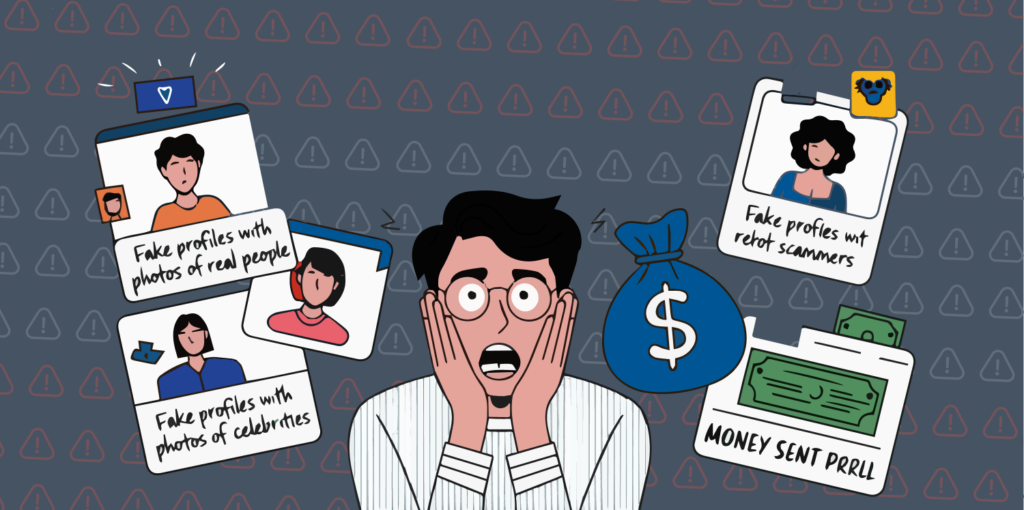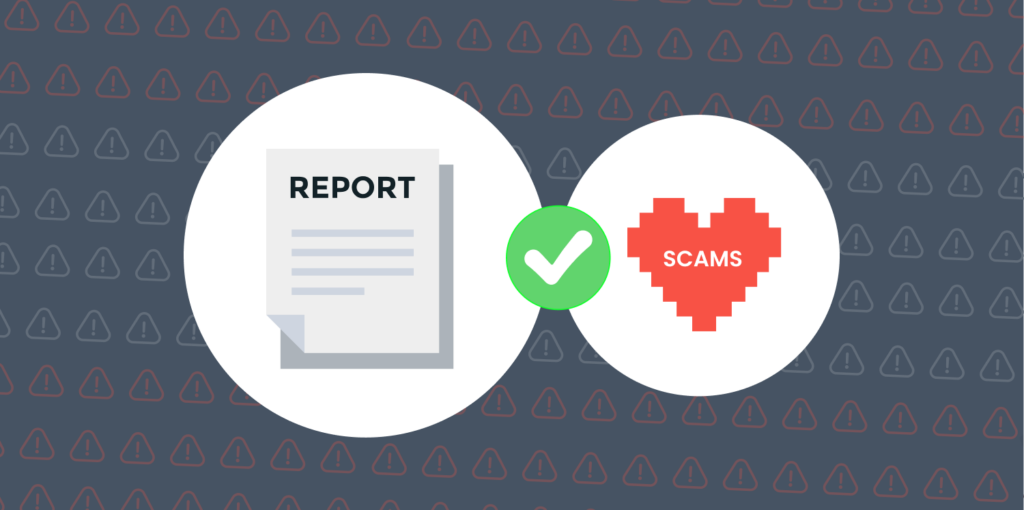
Humans are social beings; as such, it is normal that we desire love and affection. Like in many other aspects of our lives, technology has introduced digital dating to make it easier to find love. While some people have reported meeting their soulmates online, others have been exploited through promises of affection. This has led to numerous heartaches and financial losses.
Thankfully, there are ways to recognize a potential romance scam before it is too late. This article lists the common signs to spot online dating scams. You’ll also discover how you can report and protect yourself if you think you’re chatting with an online fraudster. Let’s dive in.
What are Romance Scams?

Romance scams or dating frauds happen when someone creates a false identity to build a romantic relationship with people to exploit them.
These fraudsters use different tactics to gain their victims’ trust and affection to get their money or personal information. They successfully execute this by taking advantage of the emotional nature of love alongside the anonymity of the internet.
How to Identify an Online Dating Scam

While online romance sites are connecting people all over the world, there are numerous dating fraudsters out there. As such, it is important to recognize the red flags of these predators so you don’t fall victim to them. Let’s examine some of these warning signs.
1. No Social Media Presence
We live in a digital age, and it’s unusual for someone not to have any social media presence. Even if the person you’re chatting with claims to be a private person, you should be cautious if they have no digital footprint at all. Scammers often avoid full-fledged social media profiles, so this situation raises suspicion.
2. They Seem Too Perfect to Be True
An online lover who poses to be perfect or is too good to be true is a red flag. Fraudsters sometimes present themselves as emotionally available, physically attractive, and financially successful. They aim to make you feel like you’ve hit the “ideal partner” jackpot. Always keep in mind that if someone is too good to be true, then they probably are scammers.
3. Their Photos are Always Flawless
The use of an almost flawless picture is a sign of a deceitful person. These images are often stolen from stock images or the profiles of other people. Scammers will look for attractive and polished photos to lure people.
One way to find them out is to do a reverse search on the photo to know where it was taken from. Even if you can’t trace the original photo, a picture-perfect image is worth questioning.
4. Their Job Demands a Lot of Traveling
Most dating fraudsters pose as people with jobs that require constant traveling. They can claim to be doctors, military personnel, or contractors who work overseas. This excuse is a perfect way to be unavailable for a face-to-face meeting.
5. They Ask for Money or Expensive Gifts
Be wary of an online lover who is asking for money or expensive gifts. Scammers create elaborate stories like travel expenses, medical emergencies, etc, to convince you to help them. Always remember that a real partner will not ask for financial help very early in the relationship.
6. They Keep Avoiding Video Calls
Con artists often avoid video conversations, and they give excuses like poor internet connection or discomfort with such interactions. All these excuses are lies to prevent exposing their real intentions. Someone always dodging video calls is a warning sign that they might not be who they claim to be.
7. They Start Love Bombing You
Dating fraudsters shower their victims with excessive attention, flattery, and affection within a short period. They also profess strong feelings and deep emotional attachment. The aim of this excessive affection is to cloud your judgment.
It is also to get you to trust them blindly without questioning their motives. You need to take a step back and evaluate your date seriously if they are moving too fast emotionally.
8. Frequent Claims of Family or Personal Emergencies
A lover with frequent and dramatic family and personal emergencies is probably a scammer. They are doing this to get sympathy so they can ask for financial help. These fake stories could range from a sick relative to a job loss. While real crises can happen, you need to be alert if someone you just met is always having misfortunes they want you to help with.
9. Seeking Financial Help for Investment Opportunities
Scammers can ask for your financial help, claiming that they have put their money into one project or the other. They can also try to lure you into life-changing opportunities like crypto or real estate investment.
10. They Keep Asking for Personal Details
Con artists are skillful at getting personal information. They can start by asking for general details like your full name, date of birth, or where you live. As time goes on, these questions become more intrusive, like your pet’s name.
If you refuse to answer them, they may start using reverse psychology, saying that they don’t understand why you are not opening up to them. This person is probably a scammer because someone who loves you would recognize and respect your boundaries of caution.
11. They Urge You to Move the Conversation Outside the Dating Site
You should be careful when someone you are talking with on a dating site says you should move the conversation off the platform. Dating platforms like Tinder and Bumble often have safety and reporting features that might pose a challenge to scammers.
Consequently, they want to reduce the risk of being detected by using emails, texting, or messaging apps.
Common Love Scams to Watch Out for

Many people who have been victims of dating scams have shared their experiences for others to learn from. If you are considering using a dating app, you do not need to entertain any fear.
Take note of the following types of scams to stay safe from:
1. Fake Dating Site Fraud
Fraudsters can design fake romance sites to trick people into sharing sensitive details. They often look real because they mimic legitimate platforms. Fake webpage scammers use advertisements and social media promotions to attract their potential victims.
These ads lead them directly to the fake dating site, where they will be asked to sign up. They can then be asked to pay membership fees to gather their personal information.
2. Catfishing Schemes
This happens when someone creates a fake identity by stealing photos and personal info from real people.
They then use it to build a convincing persona on the site. Catfishers can go as far as creating elaborate stories about themselves to deceive their victims into being emotionally invested in them. Once they’ve built this false bond, they fabricate emergencies and ask for financial help.
3. Military Romance Scams
A fraudster can pose as military personnel stationed overseas or in war zones. They tell sympathetic stories about serving their country and experiencing financial difficulties. Since they are abroad, they’ll say it is difficult for you to meet them in person. Also, they can send photos of real soldiers to gain your trust.
Ultimately, they’ll ask for money for things like medical bills, plane tickets, and other “urgent” needs. The claims of a military status add a layer of credibility to them. Moreover, the victim will feel patriotic and would want to support someone serving their country.
4. Code Verification Fraud
Con artists will send an email containing false verification codes from a supposed dating app. You’ll be asked to provide private details to sign up when you click the link. Once they get your information, they quickly exploit it before you realize what has happened.
5. Inheritance Scams
In such types of scams, you’ll be told you are entitled to a large inheritance or settlement. However, to access the fund, they will need your help with some funds to cover legal fees and unlock the inheritance.
Additionally, the money sent would be refunded once the process is over. You’ll keep hearing claims of extra fees to be settled until your bank account gets empty.
6. Explicit Video or Photo Scams
Fraudsters build a seemingly legitimate relationship with their target. At some point, they will ask for explicit photos or videos under the guise of building trust or intimacy.
When the files are received, they threaten to share them with the victim’s family, friends, or employer unless a ransom is paid. This situation leads to serious emotional stress as they can keep asking for money repeatedly.
7. Malware Scams
The con artist builds a romantic relationship to a point where they earn their target’s trust. Next, they send malicious software as a photo, link, or file attachment. Immediately after it is downloaded, the malware accesses their computer, smartphone, and personal accounts to get sensitive data.
8. Sugar Daddy/Sugar Mommy Scams
These fraudsters pose as wealthy people looking to pamper their romantic partners with lots of gifts and money. But first, you’ll have to send some money to cover a minor fee. Once they receive the money they requested, they vanish into thin air.
Online Dating Scams Examples

Dating fraud can happen irrespective of your age, background, or level of education. Below are some real-life examples of infamous scams. Learning from them is important to recognize and protect yourself from similar schemes.
1. The Tinder Swindler (Simon Leviev)
Simon Leviev (formally known as Shimon Hayut) posed as the son of a billionaire diamond mogul. He would showcase his lavish lifestyle by sharing pictures of private jets, five-star hotels, and expensive parties. He wooed many women and gained their trust. Much later, he would start complaining that his “enemies” were after him because of his high-profile status.
Under the guise of running to protect his life, he would convince these women to send large amounts of money to cover for security, travel, and accommodation. Each target believed they were helping their wealthy boyfriend through a tough time that would soon pass, and they would be together eventually.
Leviev kept borrowing money from different women with promises to pay back, which never happened. Because his victims were always emotionally invested, they maxed out their credit cards and even took out loans.
By the time he was caught, he had stolen millions of dollars from multiple women all over Europe. The story of this incident was released in a 2022 Netflix documentary.
2. The Sophia and Aaron Romance Fraud
After meeting on a dating site, Sophia and Aaron (not their real names) spoke about buying a house and moving in together. Aaron sent false mortgage documents and asked Sophia for large amounts of money for their plans to buy the house.
She took out about £60,000 from her savings and borrowed from family and friends. Eventually, she sent a total of £300,000 to the man she met online.
3. The Ryan Chen Case
Rya Chen (not the real name) was matched on a dating app with a woman who lived in Manchester. They shared their Facebook and WeChat details and started talking frequently. She asked that they exchange nudes, which Chen agreed to after she sent him a video.
The lady stopped replying to him for some hours. Later, she sent him a list of all his Facebook friends. Next, she said she would forward the video to all his friends if he didn’t send $4,000 to an account she provided. After panicking for some time, Chen calmed down when he saw a piece of advice on the National Crime Agency website.
He told the police what had happened and warned his family and friends that a scammer might message them. The woman kept threatening him for three months, and then he told her to go through with it. She never did, and he never heard from her again.
4. Nigerian Romance Fraudsters
Eight Nigerian men were arrested in Cape Town for defrauding over 100 women of $7 million. Their targets were divorcees and vulnerable widows.
The scammers would first build a fake romantic relationship. Next, they’ll start creating sob stories that they need money to settle taxes and crippling debts. After drawing off the money, they intimidated their victims, berated them, and disappeared.
5. Pig Butchering Scams (Barry May Case)
An Asian woman named Anna, who supposedly lived in New York, contacted Barry May on Facebook. As they chatted, Anna would send May explicit photos. He fell in love, and she agreed that they could be together. However, she first needed a favor.
Anna explained that her aunt had some of her money ($3 million). All Barry needed to do was invest in cryptocurrency with promises of huge returns. Then, her aunt would release the money, and they could get married. Barry sold and liquidated his properties and sent Anna over $500,000.
She showed him a website that appeared to reveal his holdings. May was about to take out more loans to send to Anna, but received a call from the FBI. He was told that he was a victim of a major fraud situation.
How to Report Online Dating Scams

With the rise of online scams, government and law officials have made it easier for victims to report the situation. However, the process varies from place to place. Depending on where you live, here is a list of where you can report dating fraud:
- In the US: Federal Trade Commission (FTC) or the FBI’s Internet Crime Complaint Center (IC3)
- In the UK: Action Fraud
- In Europe: EUROPOL
- In Australia: The Australian Competition and Consumer Commission (ACCC)
- Internationally: econsumer.gov
Do This if You Suspect You’re Dating a Scammer

Finding out that you have been dating a fraudster can be shocking, and it is natural to feel embarrassed or overwhelmed. However, it is important to take the right steps to prevent further damage immediately.
- Don’t panic or beat yourself up: Romance scammers are generally skilled at manipulating emotions. The fact that you fell for their tactics doesn’t mean there’s something wrong with you. The key is to calm down so you can approach the situation with a clear mind.
- Cut-off communication immediately: When you suspect that your “lover” is a fraud, stop all communication. If possible, block them on other platforms where you’ve been in touch. Remember to be firm and don’t entertain any explanation or pleas they would try to bring.
- Report the swindler to the dating site: Most of these platforms have dedicated teams that handle dating fraud. You’ll be protecting both yourself and others from being victims of a scam by reporting the swindler.
- Report to the Internet Crime Complaint Center (IC3): File a report to the FBI’s IC3, especially if you shared personal details with the con artist. You’ll have to fill out a form to help the officials investigate the situation properly.
- Freeze your credit: Once you realize that a fraudster has your sensitive financial information, you should freeze your account as soon as possible. Reach out to your credit institution and ask for a credit freeze. Additionally, consider setting up a fraud alert on your account to receive a notification if the scammer tries to use your data.
- Change your passwords: Change the passwords to your accounts if you have shared them with the swindler. Make sure you create a strong PIN for your accounts and activate two-factor authentication (2FA) where necessary.
- Sign up for identity theft protection: This service helps you monitor your personal data across different platforms. It also alerts you to unauthorized use and helps you recover from identity theft.
